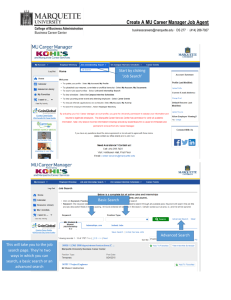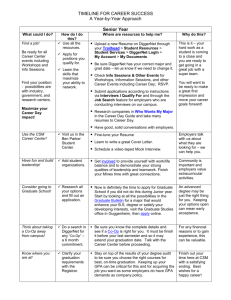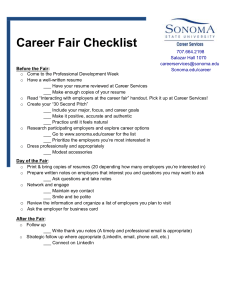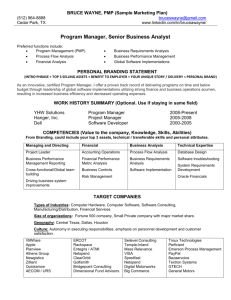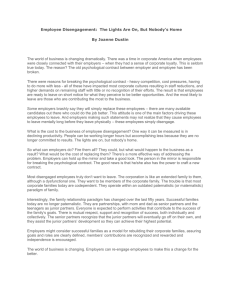Gain Experience and Develop Marketable Skills
advertisement
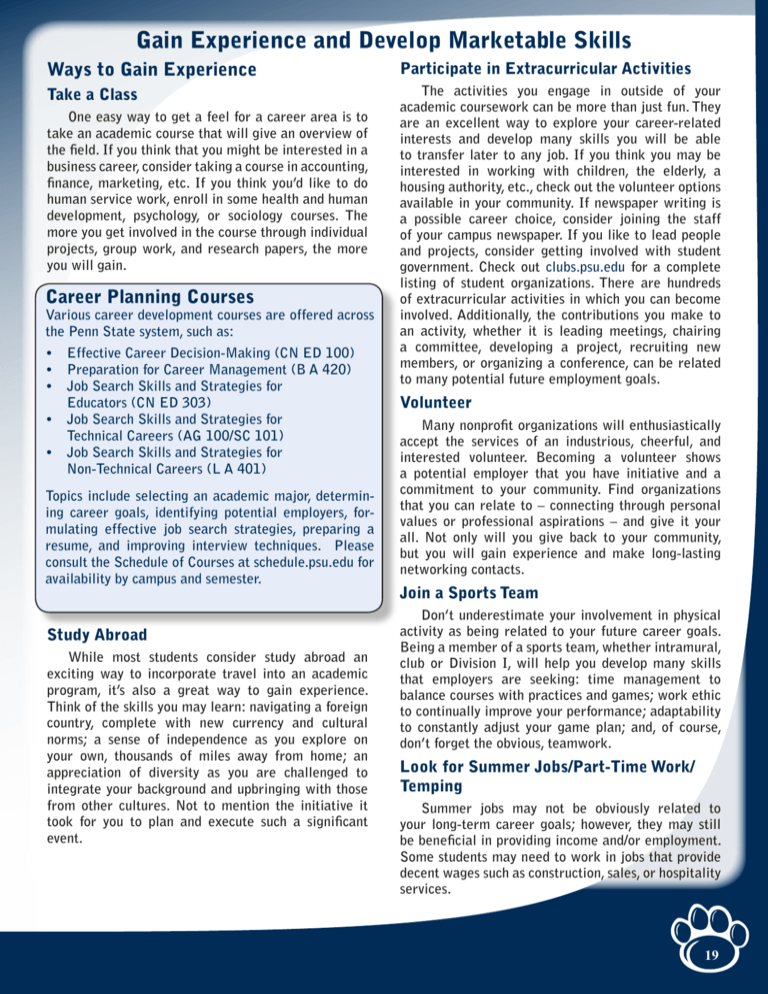
Gain Experience and Develop Marketable Skills Ways to Gain Experience Participate in Extracurricular Activities Take a Class The activities you engage in outside of your academic coursework can be more than just fun. They are an excellent way to explore your career-related interests and develop many skills you will be able to transfer later to any job. If you think you may be interested in working with children, the elderly, a housing authority, etc., check out the volunteer options available in your community. If newspaper writing is a possible career choice, consider joining the staff of your campus newspaper. If you like to lead people and projects, consider getting involved with student government. Check out clubs.psu.edu for a complete listing of student organizations. There are hundreds of extracurricular activi­ties in which you can become involved. Additionally, the contributions you make to an activity, whether it is leading meet­ings, chairing a committee, developing a project, recruiting new members, or organizing a conference, can be related to many potential future employment goals. One easy way to get a feel for a career area is to take an academic course that will give an overview of the field. If you think that you might be interested in a business career, consider taking a course in accounting, finance, marketing, etc. If you think you’d like to do human service work, enroll in some health and human development, psychology, or sociology courses. The more you get involved in the course through individual projects, group work, and research papers, the more you will gain. Career Planning Courses Various career development courses are offered across the Penn State system, such as: • • • • • Effective Career Decision-Making (CN ED 100) Preparation for Career Management (B A 420) Job Search Skills and Strategies for Educators (CN ED 303) Job Search Skills and Strategies for Technical Careers (AG 100/SC 101) Job Search Skills and Strategies for Non-Technical Careers (L A 401) Topics include selecting an academic major, determining career goals, iden­tifying potential employers, formulating effective job search strategies, preparing a resume, and improving interview techniques. Please consult the Schedule of Courses at schedule.psu.edu for availability by campus and semester. Study Abroad While most students consider study abroad an exciting way to incorporate travel into an academic program, it’s also a great way to gain experience. Think of the skills you may learn: navigating a foreign country, complete with new currency and cultural norms; a sense of independence as you explore on your own, thousands of miles away from home; an appreciation of diversity as you are challenged to integrate your background and upbringing with those from other cultures. Not to mention the initiative it took for you to plan and execute such a significant event. Volunteer Many nonprofit organizations will enthusiastically accept the services of an industrious, cheerful, and interested volunteer. Becoming a volunteer shows a potential employer that you have initiative and a commitment to your community. Find organizations that you can relate to – connecting through personal values or professional aspirations – and give it your all. Not only will you give back to your community, but you will gain experience and make long-lasting networking contacts. Join a Sports Team Don’t underestimate your involvement in physical activity as being related to your future career goals. Being a member of a sports team, whether intramural, club or Division I, will help you develop many skills that employers are seeking: time management to balance courses with practices and games; work ethic to continually improve your performance; adaptability to constantly adjust your game plan; and, of course, don’t forget the obvious, teamwork. Look for Summer Jobs/Part-Time Work/ Temping Summer jobs may not be obviously related to your long-term career goals; however, they may still be beneficial in providing income and/or employment. Some students may need to work in jobs that provide decent wages such as construction, sales, or hospitality services. 19 In these situations, you can develop skills transferable to professional careers after college. For example, a server could benefit from acquiring expe­ rience in training other employees in a restaurant or customer service skills. Explore Undergraduate Research Opportunities Penn State offers a variety of oppor­tunities for undergraduate students to participate in research projects. These experiences allow you to work with faculty and staff in your area of interest, build specific skills, and further explore your career options. Check with an advisor in your academic department to see what type of research is being conducted or go to undergradresearch.psu.edu to review projects listed by academic college and depart­ ment. If you are considering graduate school, helping out in a lab is a great way to get introduced to what may be expected when you continue your education. You will gain a deeper understanding of the research process, as well as knowledge of cutting edge developments within your field. Apply for Experiential Internships or Cooperative Education Internships are intended to provide professional experience related to your major and/or career plans. Internships may be for credit and/or paid and vary in length. Many internships are offered for one semester or over the summer, although some may provide more lengthy experiences by spanning a summer and an additional semester. Because of the size and diversity of academic programs at Penn State, resources for assisting students in obtaining internships can be quite varied. Most academic departments and colleges have specific internship offices. Be sure to check with your academic college/department to identify the resources and programs in place. Cooperative education is often confused with internships since it, too, provides professional relevant experience. However, cooperative education differs from internships in that it is an alter­ nating work experience blended into the academic program, typically within the science and engineering disciplines. Therefore, a student will leave the University multiple times during the baccalaureate degree program to obtain cooperative experi­ence with an employer. Workshops and Seminars Several hundred seminars and outreach programs are offered each year on a wide range of topics such as career planning, resume writing, interview skills, job and internship search strategies, and graduate school applications. Workshops are posted on Career Services’ website as they are offered. Also, Career Services staff members respond to requests for programs from student organizations, residence hall floors/areas, and faculty. If you are a member of an organization and wish to schedule a presentation on one of the topics above with a focus on your organization’s career needs, simply contact the Career Services office at 865-5131 or careerworkshops@psu.edu. Classes related to my areas of interest: Organizations I am in or would like to join: Other opportunities I’d like to explore: 20 indicated its importance. (See Figure 38.) Problem-solving skills, written communication skills, and teamwork are also highly sought after. Figure 38: Attributes employers seek on a candidate’s resume 80.6% % 75.3% % LLeadership d hi 74.7% 74.2% % Communnicicat Communication atition io skills (written) Ability Abilit to t workk in i a team t 67.2% 7.2% 66.7% % Problem-solving P bl l i skills kill 72.0% % 73.1% % 30 | Job Outlook 2013 | National Association of Colleges and Employers Analytical/quantitative nalytical al/q l/qua /quant ntitative k ll skills 64.5% 4.5% % Communication ommunnicicat atition io skills (verbal) Strong workk ethic St thi 64.0% 4.0% % 57.5% .5% Initiative I iti ti .5% % 57.5% What sets two equally qualified candidates apart? Figure 39 reaffirms the fact that employers are looking for leaders. Holding a leadership positionCComputer andt having theTechnical influence ratings by employers skills kill T right h i l skills killmajor continually DDetail-oriented t il i t d receive Flexibility/adaptability ibilit /the d t highest bilit deciding between two equally qualified candidates. 33.3% % 57.0% .0% % 49.5% % % 32.8% This year, NACE added fluency in a foreign language and experience studying abroad to its list of attributes. Since not quite one-third of respondents reported that they recruit new college graduates for positions outside the United States, Interpersonal erper errso son ona nal sk nal skills Friendly/outgoing dl Strategic the importance ratings for these two attributes fall end of the scale. Moreover, the responses from the t well ll to t others) th ) ti on l ability bilitthe lower (relates Organizational personality planning skills employers that do recruit for positions outside the United States shows the ratings only increase minimally. The rating for 25.8% % 25.8% % % “fluency in a foreign language” bumps up from 2.4 to 2.7, while23.7% that for “studying abroad” increases slightly from 2.3 to 2.6. Creativity Entrepreneurial Tactfulness skills/risk-taker 32 | Job Outlook 2013 | National Association of Colleges and Employers Figure 39: Influence of attributes Attribute 2013 Average Influence Rating* 2012 Average Influence Rating* Has held leadership position 4.0 3.9 Do new graduate recruits measure up in the eyes of employers on the skills/attributes they desire? Major 4.0 3.9 Highwere GPA asked (3.0 ortoabove) 3.6scale as follows: F, D-, D, Employers “grade” their new recruits on3.8 skills/attributes listed below on a letter D+, C-, C, C+, b-, b, b+, A-, A, A+. Numerical values were assigned from 1 through 13, and the results are shown in Has been involved in extracurricular Figure 41. activities (clubs, sports, student 3.6 3.7 government, etc.) For the most part, it appears that employers are satisfied with their new graduate recruits, giving grades of “b” or better SchoolGraduates attended appear to be hitting the mark 3.1on teamwork skills, but both verbal and 3.0 written communication in all categories. skills are graded lower. Two respondents did give average letter grades of “D-” and “D” to their new recruits for their Has done volunteer work 2.8 3.1 written communication skills. In addition, the work ethic and initiative categories each received one grade of “D+.” Is fluent in a foreign language1 2.4 N/A Also important in employers’ specifically related-work experience. N/A less than 5 percent of Has studied abroad1eyes is work experience, 2.3 respondents report that work experience doesn’t factor into their hiring decisions for new college graduates, and more 1 not included in prior years’ surveys. than 70 percent prefer relevant workAttribute experience. (See Figure 42.) *5-point scale, where 1=No influence at all, 2=Not much influence, 3=Somewhat of an influence, 4=very much influence, and 5=Extreme influence. Figure 42: Employers’ hiring preferences relative to experience, by percent of respondents Hiring Preference 2013 2012 2011 I prefer to hire candidates with relevant work experience 71.0% 73.7% 72.4% I prefer to hire candidates with any type of work experience (doesn’t matter if it’s relevant or not, just some type of experience) 19.9% 17.5% 17.6% Work experience doesn’t typically factor into my decision when hiring a new college graduate 4.8% 4.1% 5.3% Other 4.3% 4.6% 4.7% Reprinted from Job Outlook 2013, with permission of the National Association of Colleges and Employers, copyright holder. Figure 43: Employers’ preference for work experience, by percent of respondents Digging deeper into employers’ preference for work experience, close to 60 percent of 21
